International Management Case Study: Leadership Analysis of Tata
VerifiedAdded on 2023/06/14
|9
|1474
|455
Case Study
AI Summary
This case study delves into the international management challenges faced by Tata Group, particularly focusing on leadership and strategic decision-making. It identifies source problems like a collapsing economy impacting efficiency and secondary problems such as the absence of central strategies and managing a large workforce. The analysis highlights the importance of strategic planning and financial management in international contexts. Alternatives are proposed, including stakeholder meetings and trade union involvement, to address short-term and long-term goals. Recommendations emphasize drafting plans, gaining approval from higher authorities, and creating effective teams. The implementation phase stresses evaluation, employee training, and providing safe workplaces to improve product quality and customer satisfaction. The case study underscores the need for continuous improvement and adaptation in the dynamic landscape of international management.
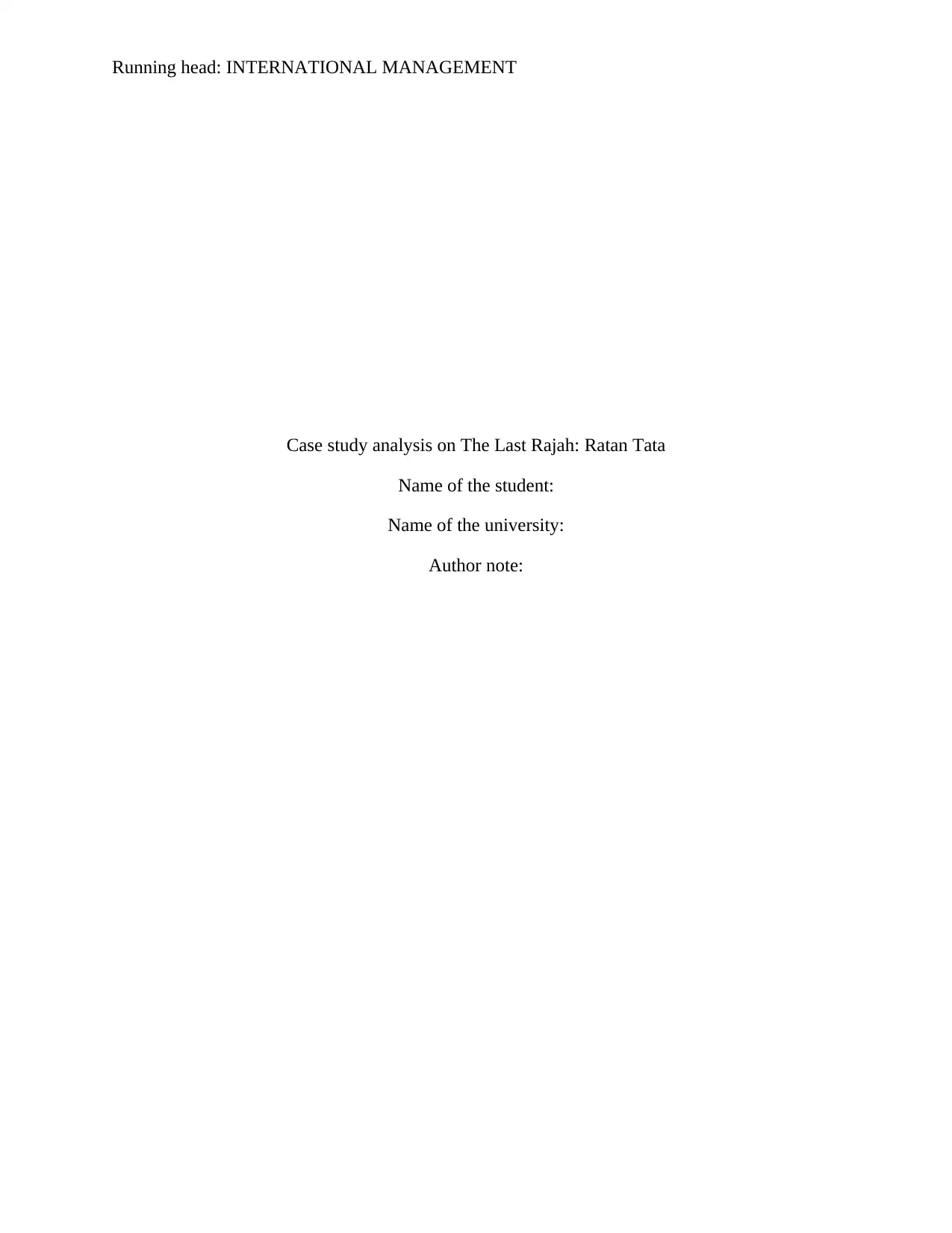
Running head: INTERNATIONAL MANAGEMENT
Case study analysis on The Last Rajah: Ratan Tata
Name of the student:
Name of the university:
Author note:
Case study analysis on The Last Rajah: Ratan Tata
Name of the student:
Name of the university:
Author note:
Paraphrase This Document
Need a fresh take? Get an instant paraphrase of this document with our AI Paraphraser
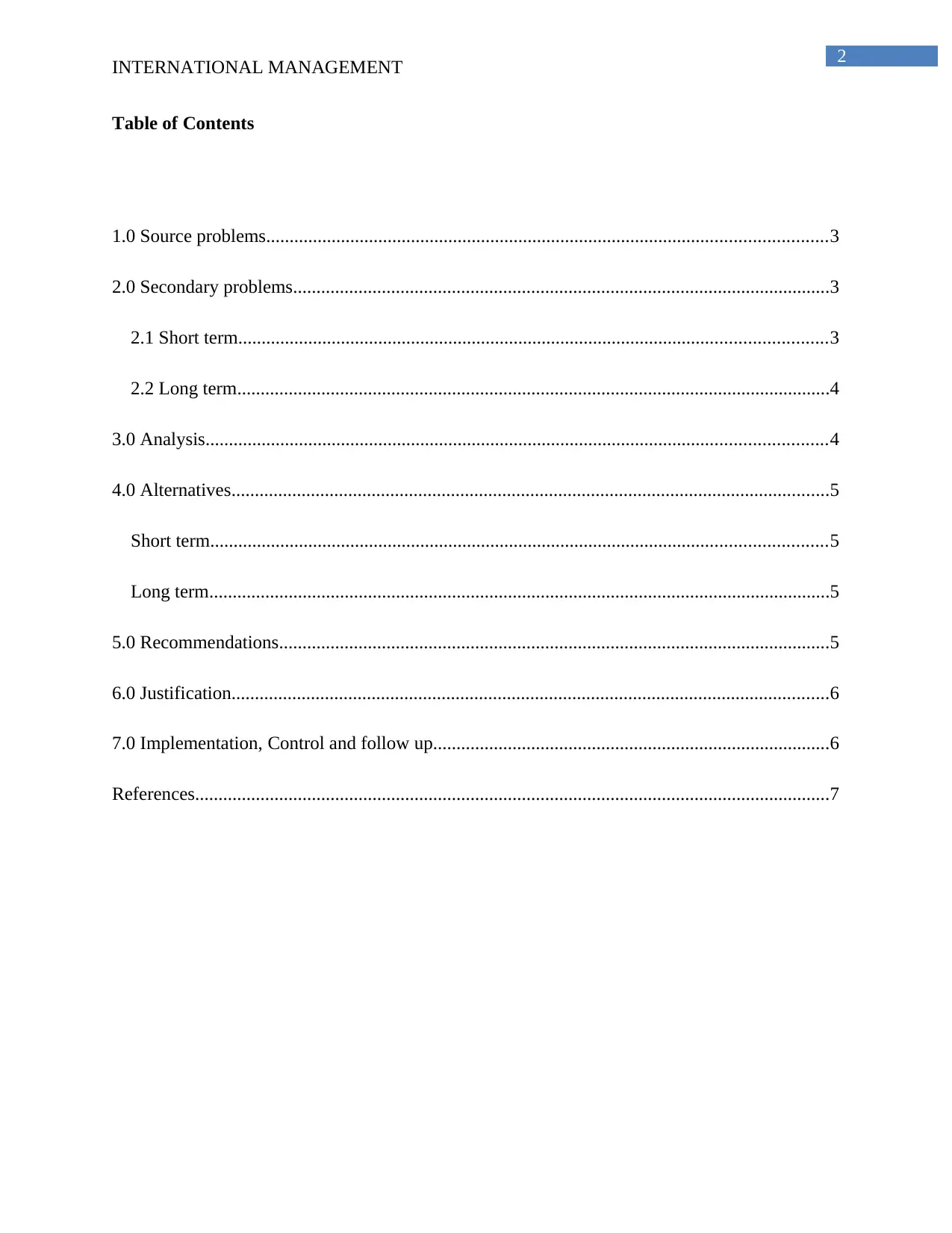
2
INTERNATIONAL MANAGEMENT
Table of Contents
1.0 Source problems........................................................................................................................3
2.0 Secondary problems...................................................................................................................3
2.1 Short term..............................................................................................................................3
2.2 Long term...............................................................................................................................4
3.0 Analysis.....................................................................................................................................4
4.0 Alternatives................................................................................................................................5
Short term....................................................................................................................................5
Long term.....................................................................................................................................5
5.0 Recommendations......................................................................................................................5
6.0 Justification................................................................................................................................6
7.0 Implementation, Control and follow up.....................................................................................6
References........................................................................................................................................7
INTERNATIONAL MANAGEMENT
Table of Contents
1.0 Source problems........................................................................................................................3
2.0 Secondary problems...................................................................................................................3
2.1 Short term..............................................................................................................................3
2.2 Long term...............................................................................................................................4
3.0 Analysis.....................................................................................................................................4
4.0 Alternatives................................................................................................................................5
Short term....................................................................................................................................5
Long term.....................................................................................................................................5
5.0 Recommendations......................................................................................................................5
6.0 Justification................................................................................................................................6
7.0 Implementation, Control and follow up.....................................................................................6
References........................................................................................................................................7
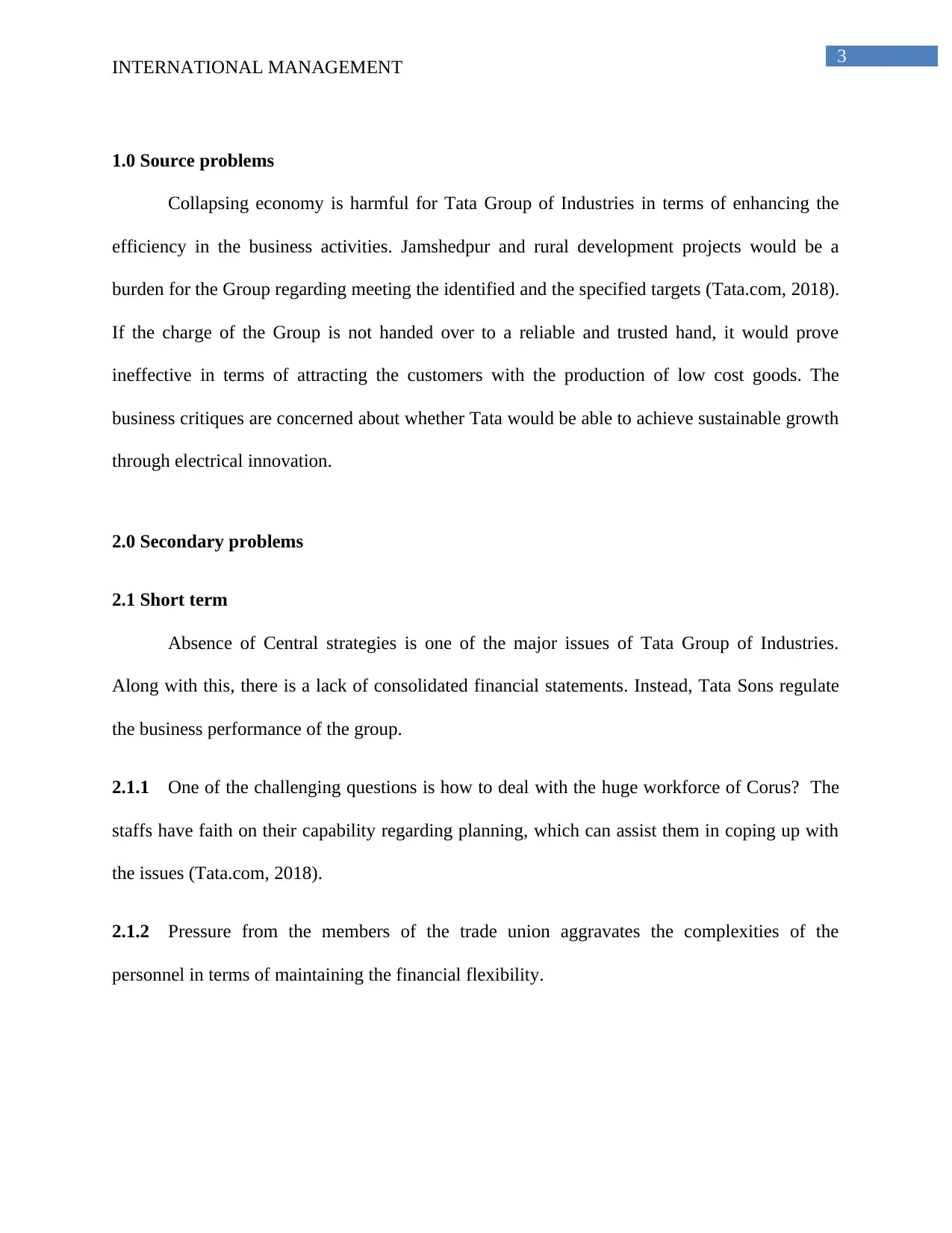
3
INTERNATIONAL MANAGEMENT
1.0 Source problems
Collapsing economy is harmful for Tata Group of Industries in terms of enhancing the
efficiency in the business activities. Jamshedpur and rural development projects would be a
burden for the Group regarding meeting the identified and the specified targets (Tata.com, 2018).
If the charge of the Group is not handed over to a reliable and trusted hand, it would prove
ineffective in terms of attracting the customers with the production of low cost goods. The
business critiques are concerned about whether Tata would be able to achieve sustainable growth
through electrical innovation.
2.0 Secondary problems
2.1 Short term
Absence of Central strategies is one of the major issues of Tata Group of Industries.
Along with this, there is a lack of consolidated financial statements. Instead, Tata Sons regulate
the business performance of the group.
2.1.1 One of the challenging questions is how to deal with the huge workforce of Corus? The
staffs have faith on their capability regarding planning, which can assist them in coping up with
the issues (Tata.com, 2018).
2.1.2 Pressure from the members of the trade union aggravates the complexities of the
personnel in terms of maintaining the financial flexibility.
INTERNATIONAL MANAGEMENT
1.0 Source problems
Collapsing economy is harmful for Tata Group of Industries in terms of enhancing the
efficiency in the business activities. Jamshedpur and rural development projects would be a
burden for the Group regarding meeting the identified and the specified targets (Tata.com, 2018).
If the charge of the Group is not handed over to a reliable and trusted hand, it would prove
ineffective in terms of attracting the customers with the production of low cost goods. The
business critiques are concerned about whether Tata would be able to achieve sustainable growth
through electrical innovation.
2.0 Secondary problems
2.1 Short term
Absence of Central strategies is one of the major issues of Tata Group of Industries.
Along with this, there is a lack of consolidated financial statements. Instead, Tata Sons regulate
the business performance of the group.
2.1.1 One of the challenging questions is how to deal with the huge workforce of Corus? The
staffs have faith on their capability regarding planning, which can assist them in coping up with
the issues (Tata.com, 2018).
2.1.2 Pressure from the members of the trade union aggravates the complexities of the
personnel in terms of maintaining the financial flexibility.
⊘ This is a preview!⊘
Do you want full access?
Subscribe today to unlock all pages.

Trusted by 1+ million students worldwide
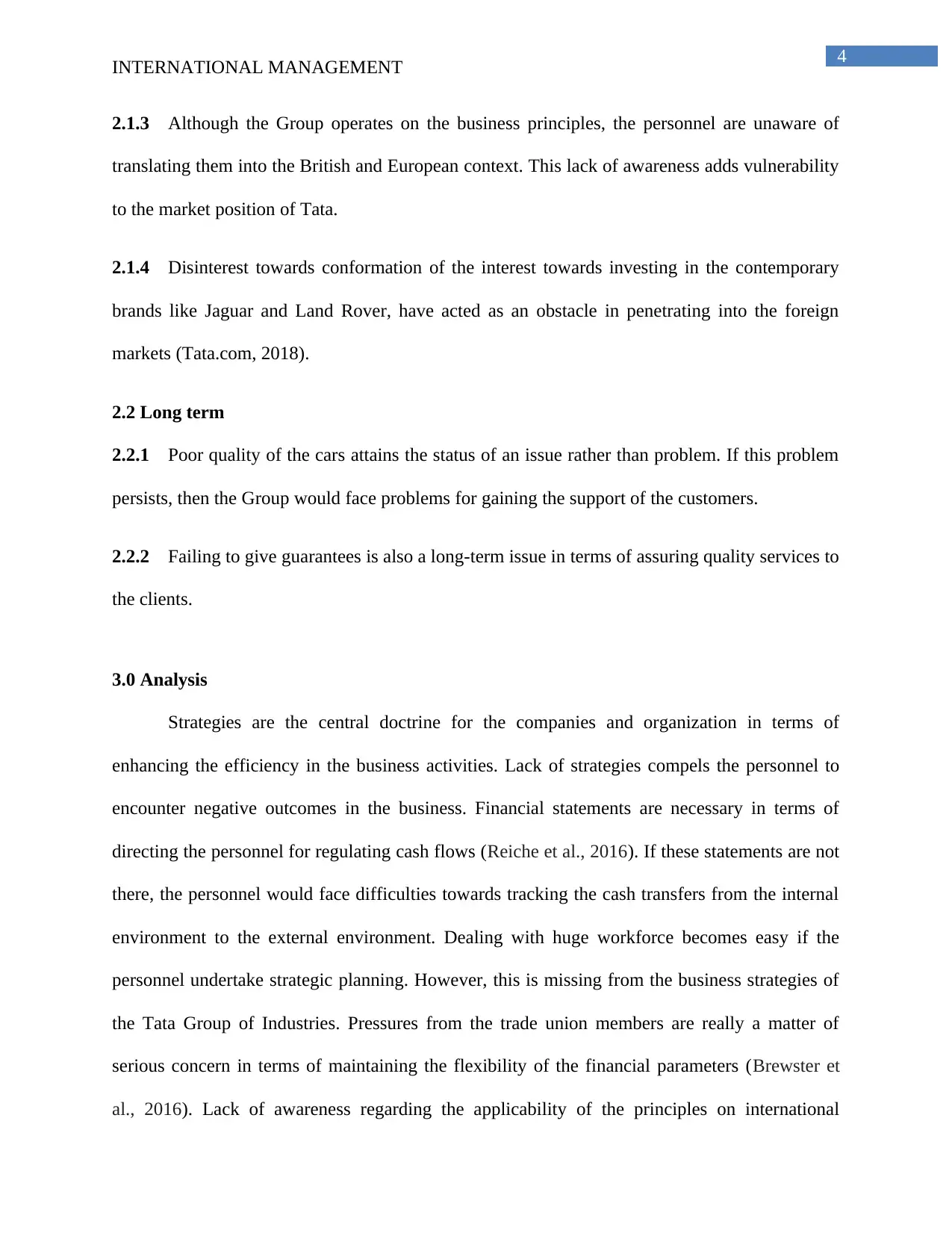
4
INTERNATIONAL MANAGEMENT
2.1.3 Although the Group operates on the business principles, the personnel are unaware of
translating them into the British and European context. This lack of awareness adds vulnerability
to the market position of Tata.
2.1.4 Disinterest towards conformation of the interest towards investing in the contemporary
brands like Jaguar and Land Rover, have acted as an obstacle in penetrating into the foreign
markets (Tata.com, 2018).
2.2 Long term
2.2.1 Poor quality of the cars attains the status of an issue rather than problem. If this problem
persists, then the Group would face problems for gaining the support of the customers.
2.2.2 Failing to give guarantees is also a long-term issue in terms of assuring quality services to
the clients.
3.0 Analysis
Strategies are the central doctrine for the companies and organization in terms of
enhancing the efficiency in the business activities. Lack of strategies compels the personnel to
encounter negative outcomes in the business. Financial statements are necessary in terms of
directing the personnel for regulating cash flows (Reiche et al., 2016). If these statements are not
there, the personnel would face difficulties towards tracking the cash transfers from the internal
environment to the external environment. Dealing with huge workforce becomes easy if the
personnel undertake strategic planning. However, this is missing from the business strategies of
the Tata Group of Industries. Pressures from the trade union members are really a matter of
serious concern in terms of maintaining the flexibility of the financial parameters (Brewster et
al., 2016). Lack of awareness regarding the applicability of the principles on international
INTERNATIONAL MANAGEMENT
2.1.3 Although the Group operates on the business principles, the personnel are unaware of
translating them into the British and European context. This lack of awareness adds vulnerability
to the market position of Tata.
2.1.4 Disinterest towards conformation of the interest towards investing in the contemporary
brands like Jaguar and Land Rover, have acted as an obstacle in penetrating into the foreign
markets (Tata.com, 2018).
2.2 Long term
2.2.1 Poor quality of the cars attains the status of an issue rather than problem. If this problem
persists, then the Group would face problems for gaining the support of the customers.
2.2.2 Failing to give guarantees is also a long-term issue in terms of assuring quality services to
the clients.
3.0 Analysis
Strategies are the central doctrine for the companies and organization in terms of
enhancing the efficiency in the business activities. Lack of strategies compels the personnel to
encounter negative outcomes in the business. Financial statements are necessary in terms of
directing the personnel for regulating cash flows (Reiche et al., 2016). If these statements are not
there, the personnel would face difficulties towards tracking the cash transfers from the internal
environment to the external environment. Dealing with huge workforce becomes easy if the
personnel undertake strategic planning. However, this is missing from the business strategies of
the Tata Group of Industries. Pressures from the trade union members are really a matter of
serious concern in terms of maintaining the flexibility of the financial parameters (Brewster et
al., 2016). Lack of awareness regarding the applicability of the principles on international
Paraphrase This Document
Need a fresh take? Get an instant paraphrase of this document with our AI Paraphraser
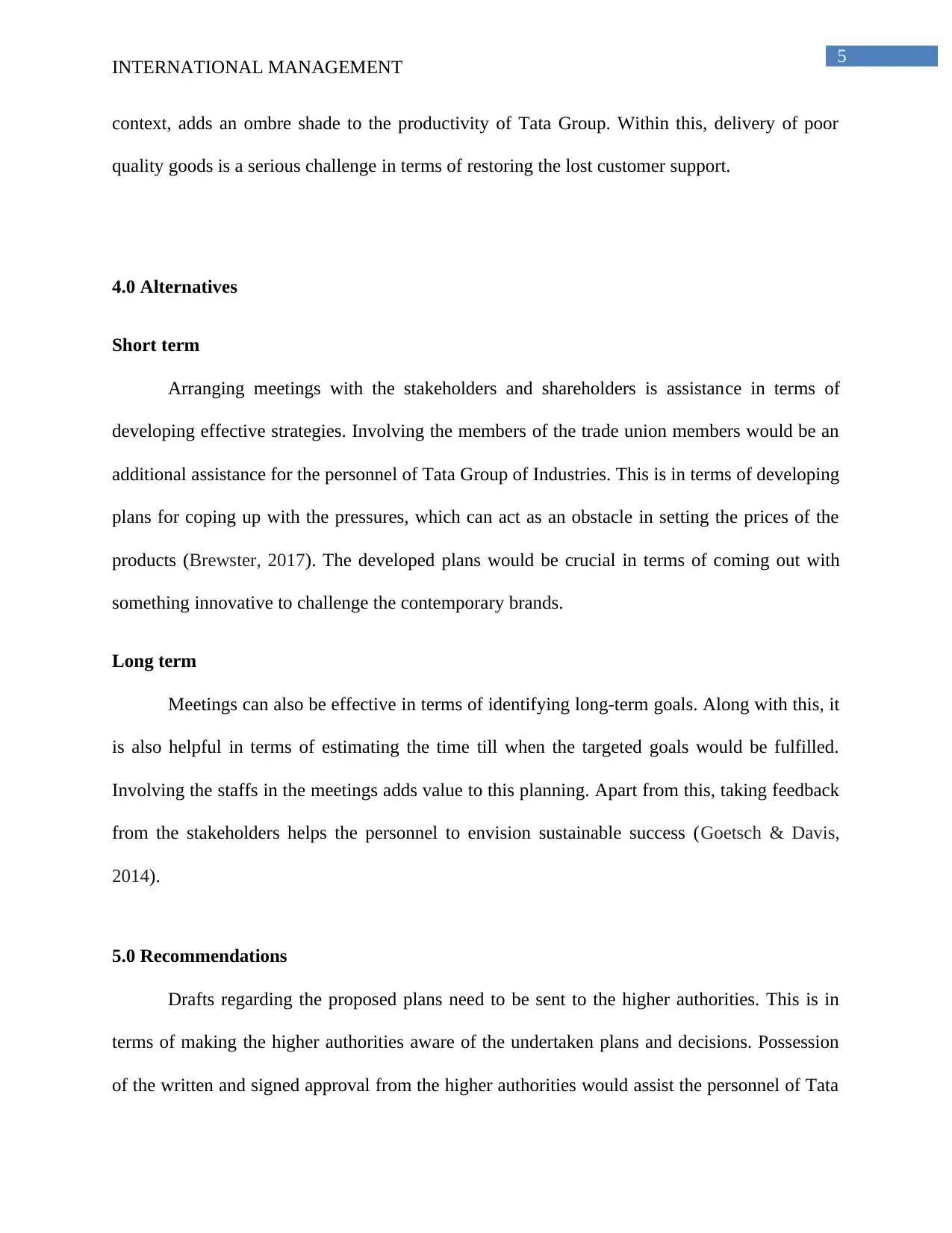
5
INTERNATIONAL MANAGEMENT
context, adds an ombre shade to the productivity of Tata Group. Within this, delivery of poor
quality goods is a serious challenge in terms of restoring the lost customer support.
4.0 Alternatives
Short term
Arranging meetings with the stakeholders and shareholders is assistance in terms of
developing effective strategies. Involving the members of the trade union members would be an
additional assistance for the personnel of Tata Group of Industries. This is in terms of developing
plans for coping up with the pressures, which can act as an obstacle in setting the prices of the
products (Brewster, 2017). The developed plans would be crucial in terms of coming out with
something innovative to challenge the contemporary brands.
Long term
Meetings can also be effective in terms of identifying long-term goals. Along with this, it
is also helpful in terms of estimating the time till when the targeted goals would be fulfilled.
Involving the staffs in the meetings adds value to this planning. Apart from this, taking feedback
from the stakeholders helps the personnel to envision sustainable success (Goetsch & Davis,
2014).
5.0 Recommendations
Drafts regarding the proposed plans need to be sent to the higher authorities. This is in
terms of making the higher authorities aware of the undertaken plans and decisions. Possession
of the written and signed approval from the higher authorities would assist the personnel of Tata
INTERNATIONAL MANAGEMENT
context, adds an ombre shade to the productivity of Tata Group. Within this, delivery of poor
quality goods is a serious challenge in terms of restoring the lost customer support.
4.0 Alternatives
Short term
Arranging meetings with the stakeholders and shareholders is assistance in terms of
developing effective strategies. Involving the members of the trade union members would be an
additional assistance for the personnel of Tata Group of Industries. This is in terms of developing
plans for coping up with the pressures, which can act as an obstacle in setting the prices of the
products (Brewster, 2017). The developed plans would be crucial in terms of coming out with
something innovative to challenge the contemporary brands.
Long term
Meetings can also be effective in terms of identifying long-term goals. Along with this, it
is also helpful in terms of estimating the time till when the targeted goals would be fulfilled.
Involving the staffs in the meetings adds value to this planning. Apart from this, taking feedback
from the stakeholders helps the personnel to envision sustainable success (Goetsch & Davis,
2014).
5.0 Recommendations
Drafts regarding the proposed plans need to be sent to the higher authorities. This is in
terms of making the higher authorities aware of the undertaken plans and decisions. Possession
of the written and signed approval from the higher authorities would assist the personnel of Tata
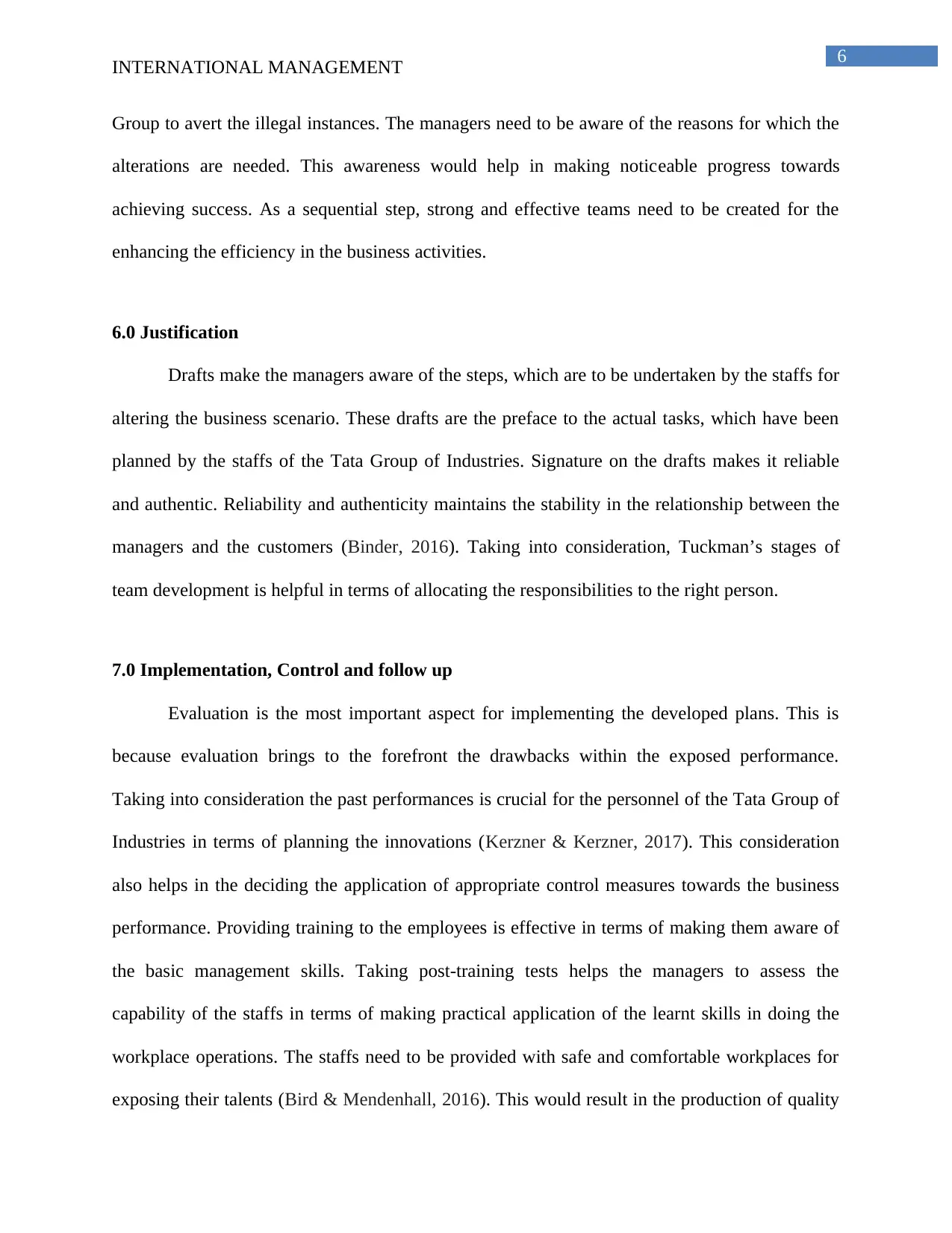
6
INTERNATIONAL MANAGEMENT
Group to avert the illegal instances. The managers need to be aware of the reasons for which the
alterations are needed. This awareness would help in making noticeable progress towards
achieving success. As a sequential step, strong and effective teams need to be created for the
enhancing the efficiency in the business activities.
6.0 Justification
Drafts make the managers aware of the steps, which are to be undertaken by the staffs for
altering the business scenario. These drafts are the preface to the actual tasks, which have been
planned by the staffs of the Tata Group of Industries. Signature on the drafts makes it reliable
and authentic. Reliability and authenticity maintains the stability in the relationship between the
managers and the customers (Binder, 2016). Taking into consideration, Tuckman’s stages of
team development is helpful in terms of allocating the responsibilities to the right person.
7.0 Implementation, Control and follow up
Evaluation is the most important aspect for implementing the developed plans. This is
because evaluation brings to the forefront the drawbacks within the exposed performance.
Taking into consideration the past performances is crucial for the personnel of the Tata Group of
Industries in terms of planning the innovations (Kerzner & Kerzner, 2017). This consideration
also helps in the deciding the application of appropriate control measures towards the business
performance. Providing training to the employees is effective in terms of making them aware of
the basic management skills. Taking post-training tests helps the managers to assess the
capability of the staffs in terms of making practical application of the learnt skills in doing the
workplace operations. The staffs need to be provided with safe and comfortable workplaces for
exposing their talents (Bird & Mendenhall, 2016). This would result in the production of quality
INTERNATIONAL MANAGEMENT
Group to avert the illegal instances. The managers need to be aware of the reasons for which the
alterations are needed. This awareness would help in making noticeable progress towards
achieving success. As a sequential step, strong and effective teams need to be created for the
enhancing the efficiency in the business activities.
6.0 Justification
Drafts make the managers aware of the steps, which are to be undertaken by the staffs for
altering the business scenario. These drafts are the preface to the actual tasks, which have been
planned by the staffs of the Tata Group of Industries. Signature on the drafts makes it reliable
and authentic. Reliability and authenticity maintains the stability in the relationship between the
managers and the customers (Binder, 2016). Taking into consideration, Tuckman’s stages of
team development is helpful in terms of allocating the responsibilities to the right person.
7.0 Implementation, Control and follow up
Evaluation is the most important aspect for implementing the developed plans. This is
because evaluation brings to the forefront the drawbacks within the exposed performance.
Taking into consideration the past performances is crucial for the personnel of the Tata Group of
Industries in terms of planning the innovations (Kerzner & Kerzner, 2017). This consideration
also helps in the deciding the application of appropriate control measures towards the business
performance. Providing training to the employees is effective in terms of making them aware of
the basic management skills. Taking post-training tests helps the managers to assess the
capability of the staffs in terms of making practical application of the learnt skills in doing the
workplace operations. The staffs need to be provided with safe and comfortable workplaces for
exposing their talents (Bird & Mendenhall, 2016). This would result in the production of quality
⊘ This is a preview!⊘
Do you want full access?
Subscribe today to unlock all pages.

Trusted by 1+ million students worldwide
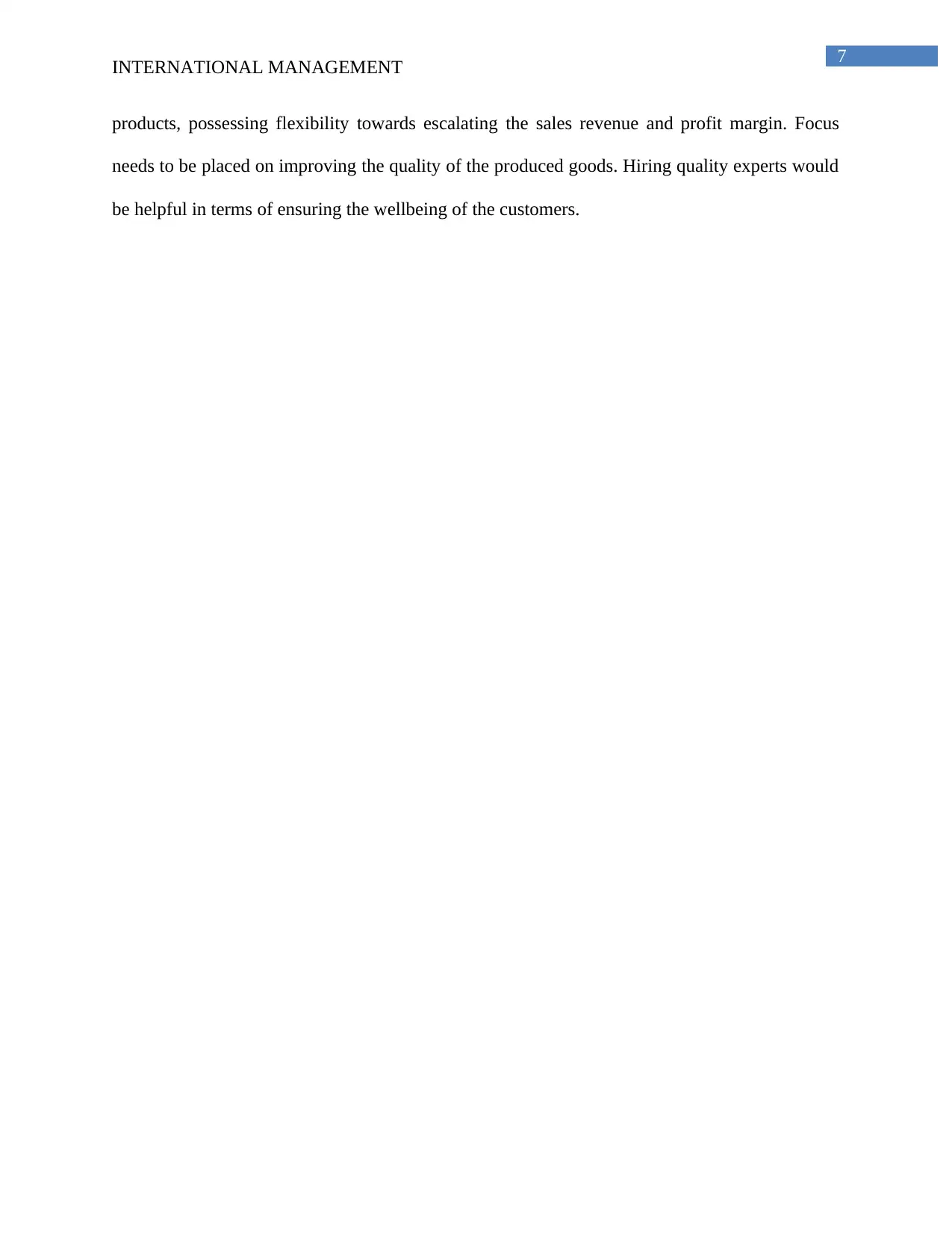
7
INTERNATIONAL MANAGEMENT
products, possessing flexibility towards escalating the sales revenue and profit margin. Focus
needs to be placed on improving the quality of the produced goods. Hiring quality experts would
be helpful in terms of ensuring the wellbeing of the customers.
INTERNATIONAL MANAGEMENT
products, possessing flexibility towards escalating the sales revenue and profit margin. Focus
needs to be placed on improving the quality of the produced goods. Hiring quality experts would
be helpful in terms of ensuring the wellbeing of the customers.
Paraphrase This Document
Need a fresh take? Get an instant paraphrase of this document with our AI Paraphraser
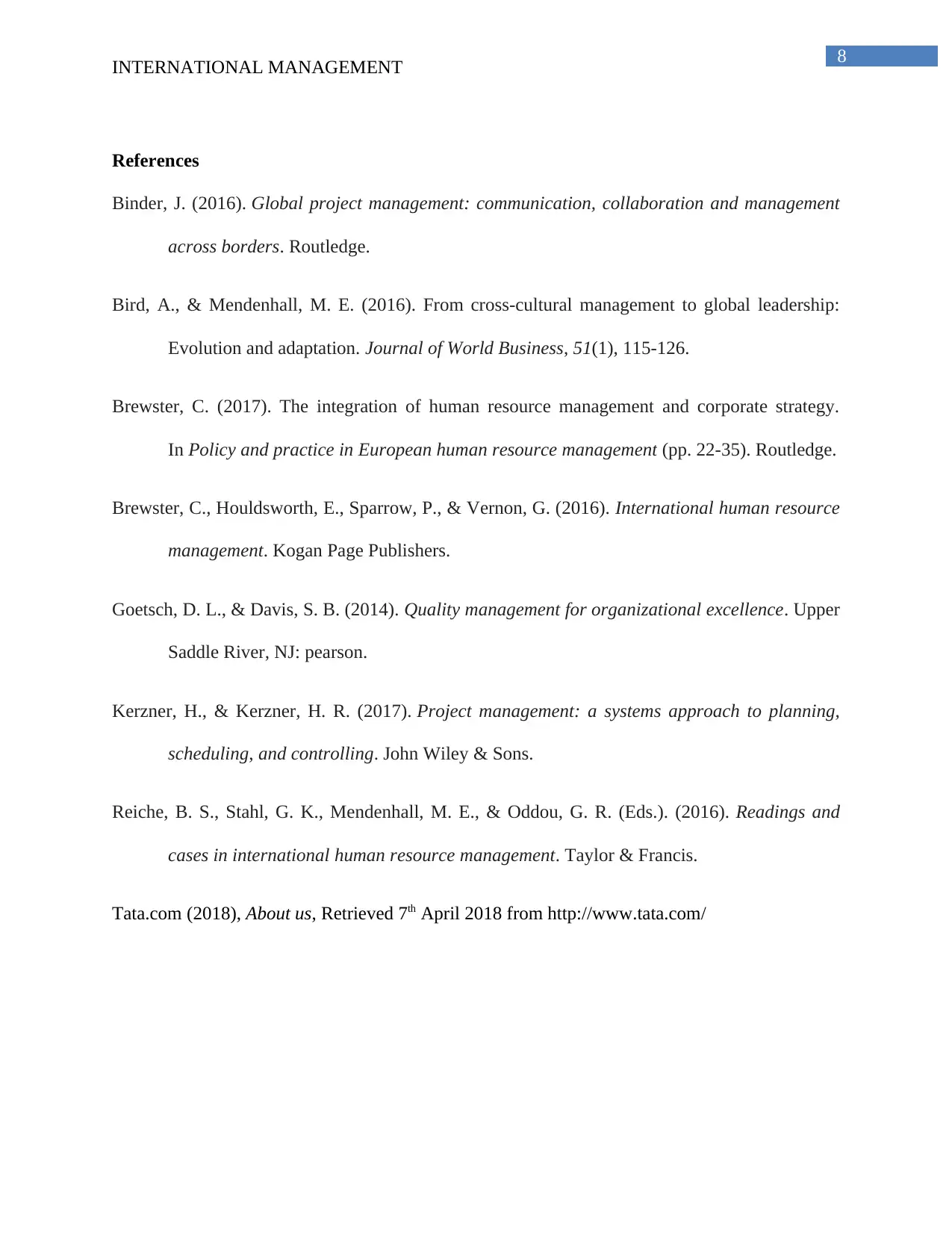
8
INTERNATIONAL MANAGEMENT
References
Binder, J. (2016). Global project management: communication, collaboration and management
across borders. Routledge.
Bird, A., & Mendenhall, M. E. (2016). From cross-cultural management to global leadership:
Evolution and adaptation. Journal of World Business, 51(1), 115-126.
Brewster, C. (2017). The integration of human resource management and corporate strategy.
In Policy and practice in European human resource management (pp. 22-35). Routledge.
Brewster, C., Houldsworth, E., Sparrow, P., & Vernon, G. (2016). International human resource
management. Kogan Page Publishers.
Goetsch, D. L., & Davis, S. B. (2014). Quality management for organizational excellence. Upper
Saddle River, NJ: pearson.
Kerzner, H., & Kerzner, H. R. (2017). Project management: a systems approach to planning,
scheduling, and controlling. John Wiley & Sons.
Reiche, B. S., Stahl, G. K., Mendenhall, M. E., & Oddou, G. R. (Eds.). (2016). Readings and
cases in international human resource management. Taylor & Francis.
Tata.com (2018), About us, Retrieved 7th April 2018 from http://www.tata.com/
INTERNATIONAL MANAGEMENT
References
Binder, J. (2016). Global project management: communication, collaboration and management
across borders. Routledge.
Bird, A., & Mendenhall, M. E. (2016). From cross-cultural management to global leadership:
Evolution and adaptation. Journal of World Business, 51(1), 115-126.
Brewster, C. (2017). The integration of human resource management and corporate strategy.
In Policy and practice in European human resource management (pp. 22-35). Routledge.
Brewster, C., Houldsworth, E., Sparrow, P., & Vernon, G. (2016). International human resource
management. Kogan Page Publishers.
Goetsch, D. L., & Davis, S. B. (2014). Quality management for organizational excellence. Upper
Saddle River, NJ: pearson.
Kerzner, H., & Kerzner, H. R. (2017). Project management: a systems approach to planning,
scheduling, and controlling. John Wiley & Sons.
Reiche, B. S., Stahl, G. K., Mendenhall, M. E., & Oddou, G. R. (Eds.). (2016). Readings and
cases in international human resource management. Taylor & Francis.
Tata.com (2018), About us, Retrieved 7th April 2018 from http://www.tata.com/
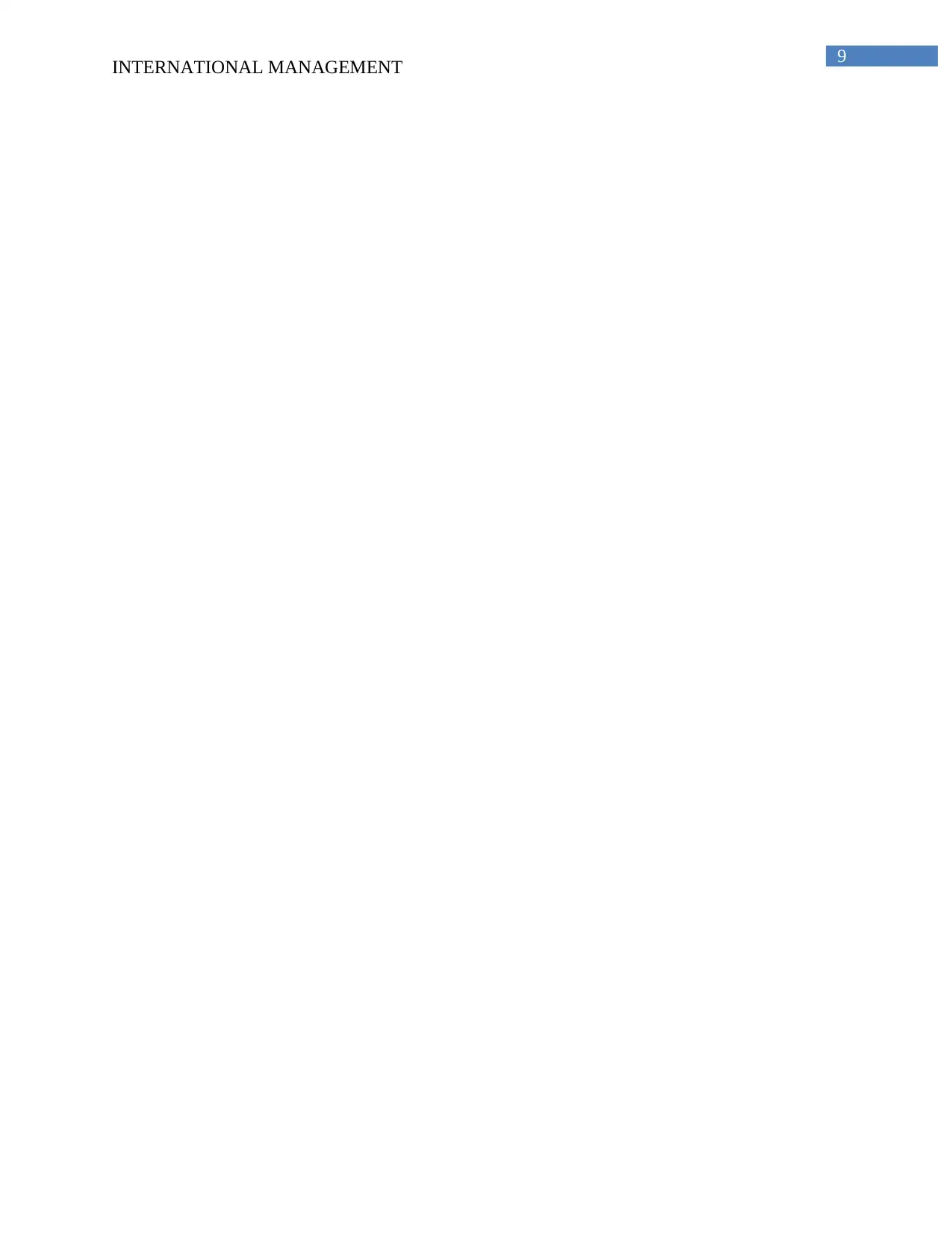
9
INTERNATIONAL MANAGEMENT
INTERNATIONAL MANAGEMENT
⊘ This is a preview!⊘
Do you want full access?
Subscribe today to unlock all pages.

Trusted by 1+ million students worldwide
1 out of 9
Related Documents
Your All-in-One AI-Powered Toolkit for Academic Success.
+13062052269
info@desklib.com
Available 24*7 on WhatsApp / Email
![[object Object]](/_next/static/media/star-bottom.7253800d.svg)
Unlock your academic potential
Copyright © 2020–2025 A2Z Services. All Rights Reserved. Developed and managed by ZUCOL.





